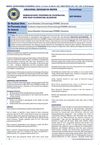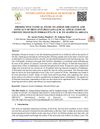 November 2024 in “Stem Cell Research & Therapy”
November 2024 in “Stem Cell Research & Therapy” Stem cells from umbilical cords can help regrow hair in mice with hair loss.
 October 2024 in “Stem Cell Research & Therapy”
October 2024 in “Stem Cell Research & Therapy” CGF therapy may effectively treat psoriasis by reducing inflammation.
 September 2024 in “Stem Cell Research & Therapy”
September 2024 in “Stem Cell Research & Therapy” HA-stimulated stem cell vesicles improved hair growth in male mice with androgenetic alopecia.
 July 2024 in “Natural Product Research”
July 2024 in “Natural Product Research” Nk-EE may help treat hair loss by promoting hair growth and preventing hair follicle damage.
 July 2024 in “Research Square (Research Square)”
July 2024 in “Research Square (Research Square)” SIRT3 and SIRT7 decrease, while NFATC1 and PDL-1 increase in Androgenetic Alopecia.
 June 2024 in “Research Square (Research Square)”
June 2024 in “Research Square (Research Square)” Early-onset AGA shows different hair and metabolic characteristics compared to normal-onset AGA.
 June 2024 in “Research Square (Research Square)”
June 2024 in “Research Square (Research Square)” Increased cell death and reduced cell growth in hair follicles contribute to baldness.
 May 2024 in “Archives of dermatological research”
May 2024 in “Archives of dermatological research” LGFs slightly improve hair transplant results more than PRP.

Baricitinib effectively promotes hair regrowth in severe alopecia with minimal side effects.
 April 2024 in “International Journal of Research Publication and Reviews”
April 2024 in “International Journal of Research Publication and Reviews” Alopecia areata causes hair loss with varied treatment responses and frequent relapses.
 January 2024 in “Journal of advanced research in Medical and Health science”
January 2024 in “Journal of advanced research in Medical and Health science” People with severe and long-lasting alopecia areata often have low vitamin D levels, and treatments with vitamin D-like substances might help.
 December 2023 in “EPRA international journal of multidisciplinary research”
December 2023 in “EPRA international journal of multidisciplinary research” Alopecia areata causes sudden hair loss, has genetic links, and can be managed but not cured.
 November 2023 in “International Journal of Medical Sciences”
November 2023 in “International Journal of Medical Sciences” New regenerative medicine-based therapies for hair loss look promising but need more clinical validation.
 November 2023 in “Translational Medicine Communications”
November 2023 in “Translational Medicine Communications” Derinat may improve hair growth and quality of life in hair loss patients by reducing oxidative stress.
 August 2023 in “International journal of research in Ayurveda and pharmacy”
August 2023 in “International journal of research in Ayurveda and pharmacy” Garudan Kizhangu Ennai may effectively treat alopecia areata but needs more research to confirm its safety and effectiveness.
 August 2023 in “International journal of research in dermatology”
August 2023 in “International journal of research in dermatology” Janus kinase inhibitors are effective and generally safe for treating hair loss in adults with alopecia areata.
 August 2023 in “Stem Cell Research & Therapy”
August 2023 in “Stem Cell Research & Therapy” A substance called Cell-free fat extract can effectively treat common hair loss by increasing hair growth and density.
 August 2023 in “Stem Cell Research & Therapy”
August 2023 in “Stem Cell Research & Therapy” Using adipose-derived stem cell media with minoxidil may help regrow hair in men with hair loss.
 August 2023 in “GLOBAL JOURNAL FOR RESEARCH ANALYSIS”
August 2023 in “GLOBAL JOURNAL FOR RESEARCH ANALYSIS” Effective hair loss treatment requires personalized approaches and patient-provider collaboration.
June 2023 in “Biological & clinical sciences research journal” Combining methotrexate with low-dose prednisone is more effective for hair regrowth in alopecia areata totalis.
June 2023 in “Australasian Journal of Dermatology” Australian dermatologists are updating their prescriptions for male pattern baldness.
 May 2023 in “Research Square (Research Square)”
May 2023 in “Research Square (Research Square)” Botulinum toxin type A helps treat hair loss by stopping cell death in hair follicles through a process involving certain non-coding RNAs and a protein called Bax.
 April 2023 in “International Journal of Research in Dermatology”
April 2023 in “International Journal of Research in Dermatology” Baricitinib is a promising treatment for severe alopecia areata with minimal side effects.
 March 2023 in “PARIPEX INDIAN JOURNAL OF RESEARCH”
March 2023 in “PARIPEX INDIAN JOURNAL OF RESEARCH” Dermoscopy helps diagnose different types of hair loss and may reduce the need for biopsies.
 January 2023 in “Postepy Dermatologii I Alergologii”
January 2023 in “Postepy Dermatologii I Alergologii” Zinc is important for health and its supplementation may help treat various conditions.
 June 2022 in “Research Square (Research Square)”
June 2022 in “Research Square (Research Square)” The conclusion is that metformin may be useful for treating various conditions beyond diabetes and that time-tracking analysis is a good way to review drug research.

Self-monitoring blood pressure in pregnant women didn't improve outcomes, diabetes drugs may increase gallbladder disease risk, a new drug helps severe hair loss, a plant-based COVID-19 vaccine is 69.5% effective, and new anticoagulants are safer for diabetics with heart rhythm issues than warfarin.
 August 2021 in “Research, Society and Development”
August 2021 in “Research, Society and Development” Minoxidil slightly increased hair volume more than Finasterida, but both reduced hair loss similarly.
 April 2021 in “The journal of investigative dermatology/Journal of investigative dermatology”
April 2021 in “The journal of investigative dermatology/Journal of investigative dermatology” Patients using social media have mixed feelings about alopecia treatments, noting hair growth but also frustration with treatment recurrence.
 July 2018 in “International journal of research - granthaalayah”
July 2018 in “International journal of research - granthaalayah” Croton tiglium application significantly improved hair regrowth in alopecia areata patients.




























